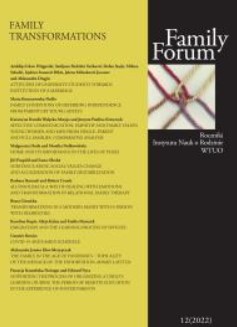Alcoholism as a way of dealing with emotions and transformation in relational family therapy
Alcoholism as a way of dealing with emotions and transformation in relational family therapy
Author(s): Barbara Simonič, Robert CvetekSubject(s): Cognitive Psychology, Behaviorism, Substance abuse and addiction, Family and social welfare
Published by: Uniwersytet Opolski
Keywords: addiction; psychotherapy; alcohol; affect regulation; family life;
Summary/Abstract: Alcoholism, which is a major public health and social problem, can be viewed from several perspectives, as its occurrence is a multifaceted phenomenon in terms of its development (causes), effects, and maintenance. The Relational Family Therapy paradigm looks at alcoholism and its dynamics in relation to dysfunctional affect regulation. Dysfunctional affect regulation and the general inability to manage emotions are often mentioned in relation to the development and maintenance of alcohol addiction. The mechanism of affect regulation generally refers to internal processes that allow an individual to maintain their emotions to a degree that feels still bearable for them. According to these assumptions, alcoholics drink in order to cope with difficult emotions, either because they have more negative emotional states than others do, or because they lack the internal resources to cope with these negative emotions. For them, consuming alcohol is a series of repeated attempts to regulate heavy emotions, which often stem from painful past experiences. The process of Relational Family Therapy, therefore, as treatment of addiction, focuses on identifying and transforming the dysfunctional regulation of affect, which is behind addictive behavior. By means of action research methodology, this paper presents the approach of Relational Family Therapy in working with an alcoholic client, with an emphasis on the aspects of affect regulation. We show how the client’s alcohol use appeared as a dynamic of inappropriate regulation of a painful core affect. In the process of Relational Family Therapy, a more functional regulation of the core affect was established, thereby reducing symptomatic behavior (alcoholism) in the client.
Journal: Family Forum
- Issue Year: 2022
- Issue No: 12
- Page Range: 121-138
- Page Count: 18
- Language: English

